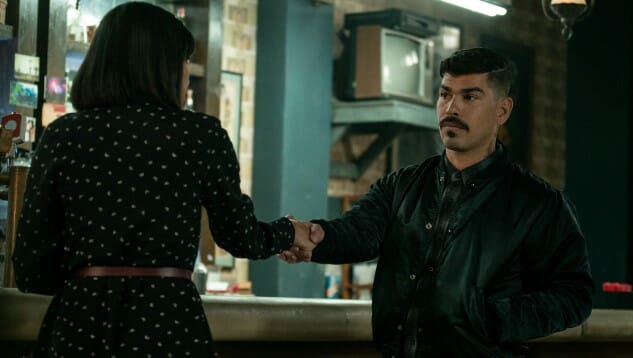With a Leading Role as a Latino Superhero and a Role in Vida’s Second Season, Raúl Castillo Is Poised for a Breakout Year
Starz Entertainment
Raúl Castillo has the kind of enviable resume that signals he’s about to break out big. Known to many (within the gay community) as Richie in HBO’s Looking, the Texan actor has quietly been making a name for himself across screens both big and small. He’s guest starred in his fair share of television shows, worked with A-list directors like Steven Soderbergh, and even earned an Independent Spirit Award nomination earlier this year for his work on We The Animals. This month alone he finally got to live out his dream of starring in his very own action movie, El Chicano, as the titular Latino superhero vigilante (the first time he was number one on the cast sheet), and got to join the critically acclaimed show Vida as the laconic Baco, one of the few straight cis male characters in the unapologetically queer Starz series that’s setting the standard for Latinx storytelling on television.
If that one-two punch suggests anything about Castillo it’s his current stature as one of the most visible and lauded Latino actors on the scene. Over the course of his career and even as he’s worked on a number of different projects, he’s been showcasing a knack for softening roughened characters and for giving an edge to those who depend on his effortless charm. It’s what made everyone hop on #TeamRichie on Looking and why even the young protagonist of We The Animals can’t help but be drawn to his drunk and abusive father, played with wounded charm by Castillo.
His role as Baco, which finds him sporting plenty of tattoos and a gruff demeanor, taps into that hardened softness the actor has so mastered. It’s a character so well-suited to his talent that it’s surprising to hear him admit he initially turned it down. It was a tough decision to make, made all the tougher because Castillo has known Tanya Saracho, the show’s creator, since he was a sophomore in high school. He was immediately drawn to her confidence and her magnetic energy. “She was really funny, gregarious, and even a bit fiery,” he remembers. “She’s always been unafraid of confrontation. I don’t know that I knew it logically, but I think I understood that I could learn a lot from her.” In between school plays in Texas and later still a stint a Boston University, the two became as close as brother and sister, supporting each other in their respective endeavors. They even got to work together in the show that arguably helped further both their careers in Hollywood: Saracho was a writer on Looking. She had sole writing credit on “Looking for Truth,” an episode that centered on Richie’s vexed relationship with his Mexican-American family.
But when she called to offer him the role of Baco, the actor found himself uneasy at the prospect of joining a television show. He was, he admits, in a bit of a rut, frustrated by the process of making television; two separate opportunities about joining TV projects had recently fizzled out. “I was at a place as an artist where I was having to make important choices, having to be more thoughtful about the choices I make and the projects that I take on. And I didn’t know what I wanted to do. You know, oftentimes, as Latinos in this industry, we’re operating from a scarcity mindset,” he told Paste. Even the prospect of saying ‘No’ to a project felt novel, as comforting as it was daunting. It proved that he’d arrived at a place where such decisions could finally be driven by artistic and not merely economic ones.
At a time when trade publications wonder out loud where the Latinx movie stars are, and when global streaming corporations pat themselves on the back for their commitment to telling Latinx stories in the same tweet they bemoan the cancellation of their banner US Latinx series, Castillo’s cautious hesitation about what path to follow feels emblematic of a larger systemic issue. Here is a Latino actor not taking his recent success for granted, and yet apprehensive about what that may mean down the road.
Acting, after all, never seemed like an achievable dream when he was growing up. “I was such a little runt who’d mumble; I wasn’t particularly handsome at the time. And I never thought I could be an actor because I wasn’t eloquent. I couldn’t do accents. I couldn’t sing so I couldn’t do musicals. They’d put me in the background.” It’s why he gravitated towards writing instead. He discovered Miguel Piñero, who wrote about Latinos in the Lower East Side in New York; he read August Wilson, who offered empathetic portraits of African-Americans in Pittsburgh; he devoured Tennessee Williams, who so captured the South in his plays. Castillo yearned to emulate their cultural specificity.